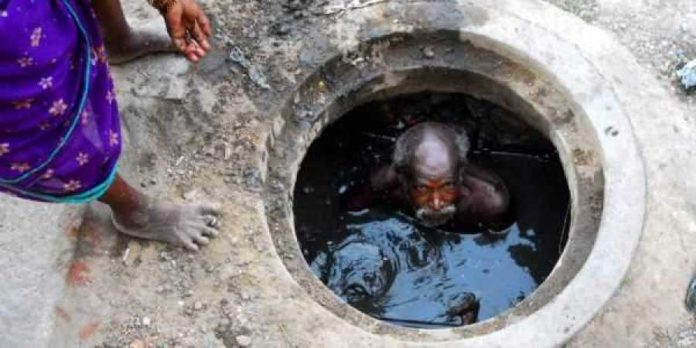In a reply to a question in the Rajya Sabha, the Union Ministry of Social Justice and Empowerment has stated that zero deaths have been reported from manual scavenging in the last five years. The question was tabled by Mallikarjun Kharge and Dr L Hanumanthaiah, before the Minister of Social Justice and Empowerment, Ramdas Athawale.
The Ministry mentioned that till date, around 66,692 manual scavengers have been identified in the country.
In another attempt to undermine the seriousness of manual scavenging faced today and the plight of those engaged in the activity, the Ministry has blatantly contradicted itself. Just few months ago, in February, The Social Justice and Empowerment Ministry told the Lok Sabha, in response to a question about manual scavengers, that 340 people had died while cleaning sewers and septic tanks in the past five years.
In addition, the overall figure of 66,692, has already been challenged by activists who state that it is a denial of how entrenched the practice is in today’s society. When looking at figures collated by the Safai Karamchari Andolan, railways alone employ five times this number and the overall figure is above one million. The Supreme Court has in the past recognised the importance of the data collected by the SKM as well.
Manual scavenging is mainly done by Schedules Castes and Scheduled Tribes and endures in India despite being outlawed in 2013. The practice is rooted in feudal and caste system that is entrenched in today’s society, forcing men and women born into ‘untouchable’ castes into the profession.
In 2013, The Prohibition of Employment as Manual Scavengers and Their Rehabilitation Act, 2013 (the 2013 Act) were passed in Parliament. But the policies are not implemented or people who refuse to do this kind of work either face intense social pressure or violence at the hand of local villagers or govt. officials. The Indian government has often stated that there has been a significant drop in manual scavengers, attributing this drop to the strict enforcement of the Prohibition of Employment as Manual Scavengers and their Rehabilitation Act, 2013 and the impact of the Swachh Bharat Abhiyan.
Despite stringent provisions in the two acts, hardly any action is visible on ground. In 2014, not a single FIR was filed as per the 57th Standing Committee of Social Justice and Empowerment, 2017-2018. In 2015, two cases under the law were reported from Karnataka in the National Crime Records Bureau report. This clearly reveals a lack of commitment to the promise of ending the practice, on part of the state, bureaucracy and even society.
Read: Hyderabad: State Govt. Plans to use Robots to Clean Sewage System



